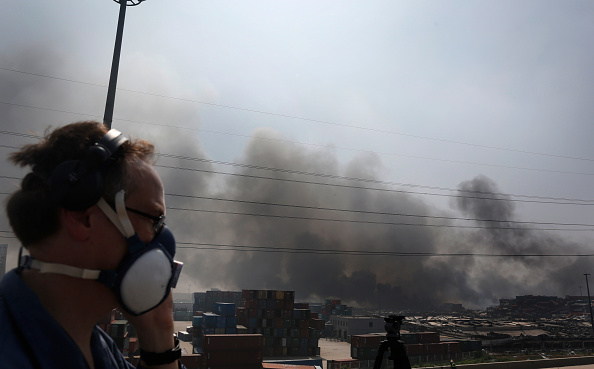-
Tips for becoming a good boxer - November 6, 2020
-
7 expert tips for making your hens night a memorable one - November 6, 2020
-
5 reasons to host your Christmas party on a cruise boat - November 6, 2020
-
What to do when you’re charged with a crime - November 6, 2020
-
Should you get one or multiple dogs? Here’s all you need to know - November 3, 2020
-
A Guide: How to Build Your Very Own Magic Mirror - February 14, 2019
-
Our Top Inspirational Baseball Stars - November 24, 2018
-
Five Tech Tools That Will Help You Turn Your Blog into a Business - November 24, 2018
-
How to Indulge on Vacation without Expanding Your Waist - November 9, 2018
-
5 Strategies for Businesses to Appeal to Today’s Increasingly Mobile-Crazed Customers - November 9, 2018
China confirms deadly sodium cyanide at Tianjin blast site
At a press conference the northern city’s deputy propaganda chief said 21 firefighters were among the dead after the enormous blasts at a hazardous materials storage facility.
Advertisement
With dozens of people still missing, authorities were also focused on trying to find any more potential survivors.
A succession of explosions Thursday were sparked by a fire at what authorities said were shipping containers containing hazardous material at a warehouse.
Rescuers Friday pulled out a firefighter who was trapped for 32 hours after responding to two huge explosions in Tianjin, state media said, as authorities moved forward gingerly in dealing with a fire still smoldering amid potentially risky chemicals. “I’m doing this for my child”.
The firemen initially sent to the scene were “investigating and testing” the area and their reinforcements were arriving when the first blast hit “all of a sudden”, Zhou Tian, head of the Tianjin firefighting bureau, told a briefing yesterday. “They were caught off guard, so the casualties are grave”, Zhou said.
Media in China have continued to question why the giant hazardous goods warehouse was allowed to operate so close to homes and other public buildings in the area.
The State Council said a nationwide inspection of unsafe chemicals and explosives would be launched, along with a crackdown on illegal activities to strengthen industry safety.
But Google Earth shows that the Ruihai firm’s two hazmat warehouses were less than 500 metres from the S11 Haibin Expressway, and within 500 metres of a 104,438-square metre apartment complex built by China Vanke, one of China’s largest developers.
“Out of consideration for toxic substances spreading, the masses nearby have been asked to evacuate”, Xinhua is quoted in The Guardian.
“Depending upon the amount of sodium cyanide that is there, I would be concerned about the residues of sodium cyanide that may have been distributed across the area, and how that cleanup will be managed”, he says.
“At that point no one knew, it wasn’t that the firefighters were stupid”, Lei said, adding that it was a large warehouse and they did not know the exact location of the calcium carbide.
There was no indication of what caused the blasts, and no sign of any toxic cloud in the air as firefighters brought the fire largely under control by morning.
Police confirmed the presence of the chemical, fatal when ingested or inhaled, “roughly east of the blast site” in an industrial zone in the northeastern port city of Tianjin, the state-run Beijing News said.
Advertisement
After Wednesday’s blasts, fire crews were criticized for using water to douse flames which may have contributed to the blasts given the volatile nature of the chemicals involved.





























